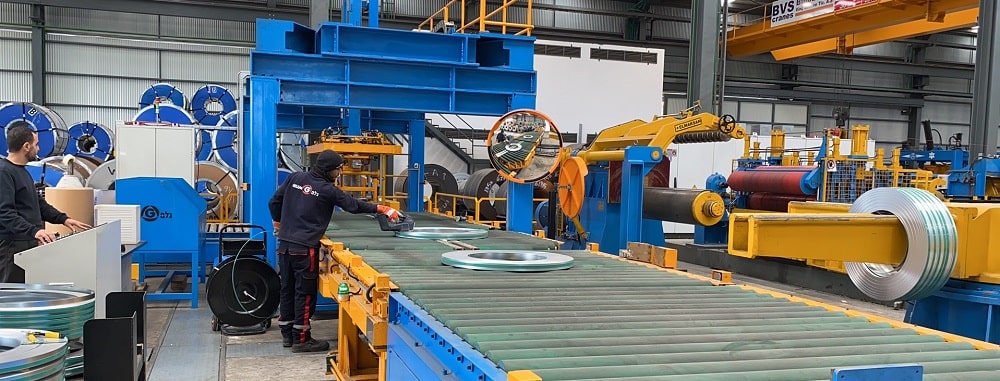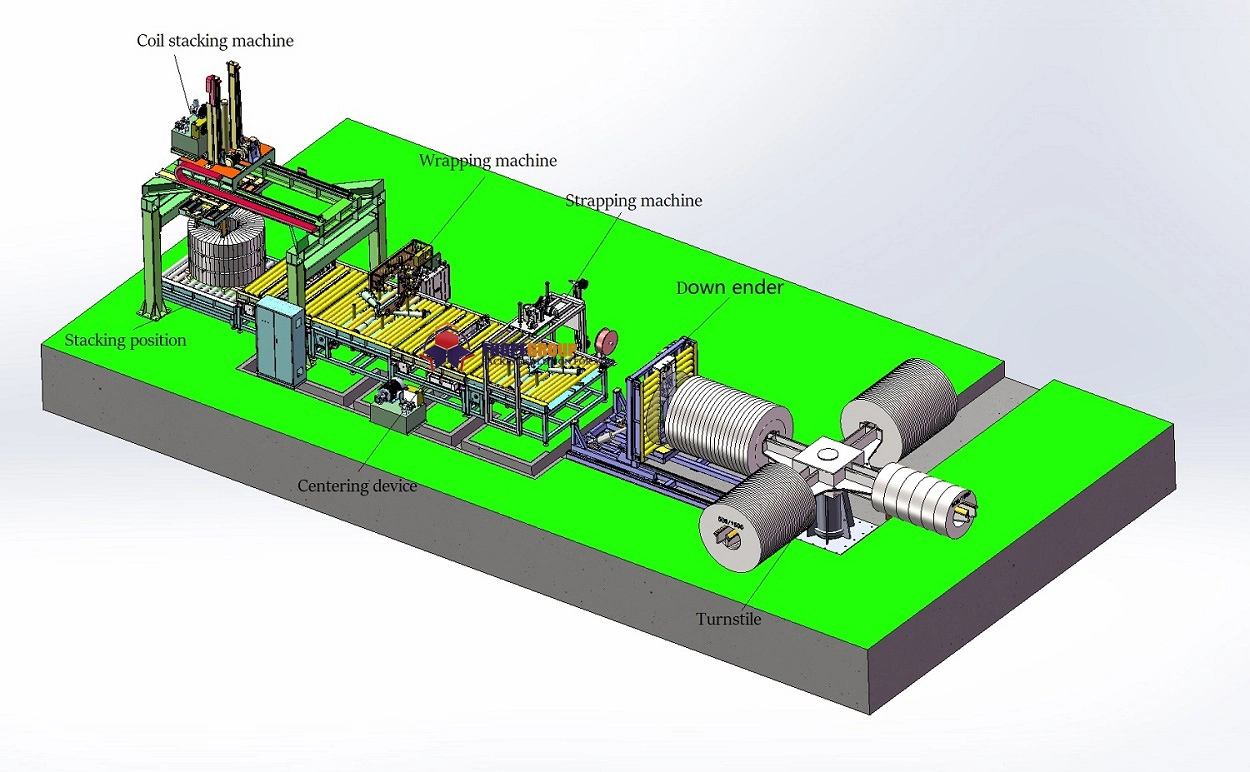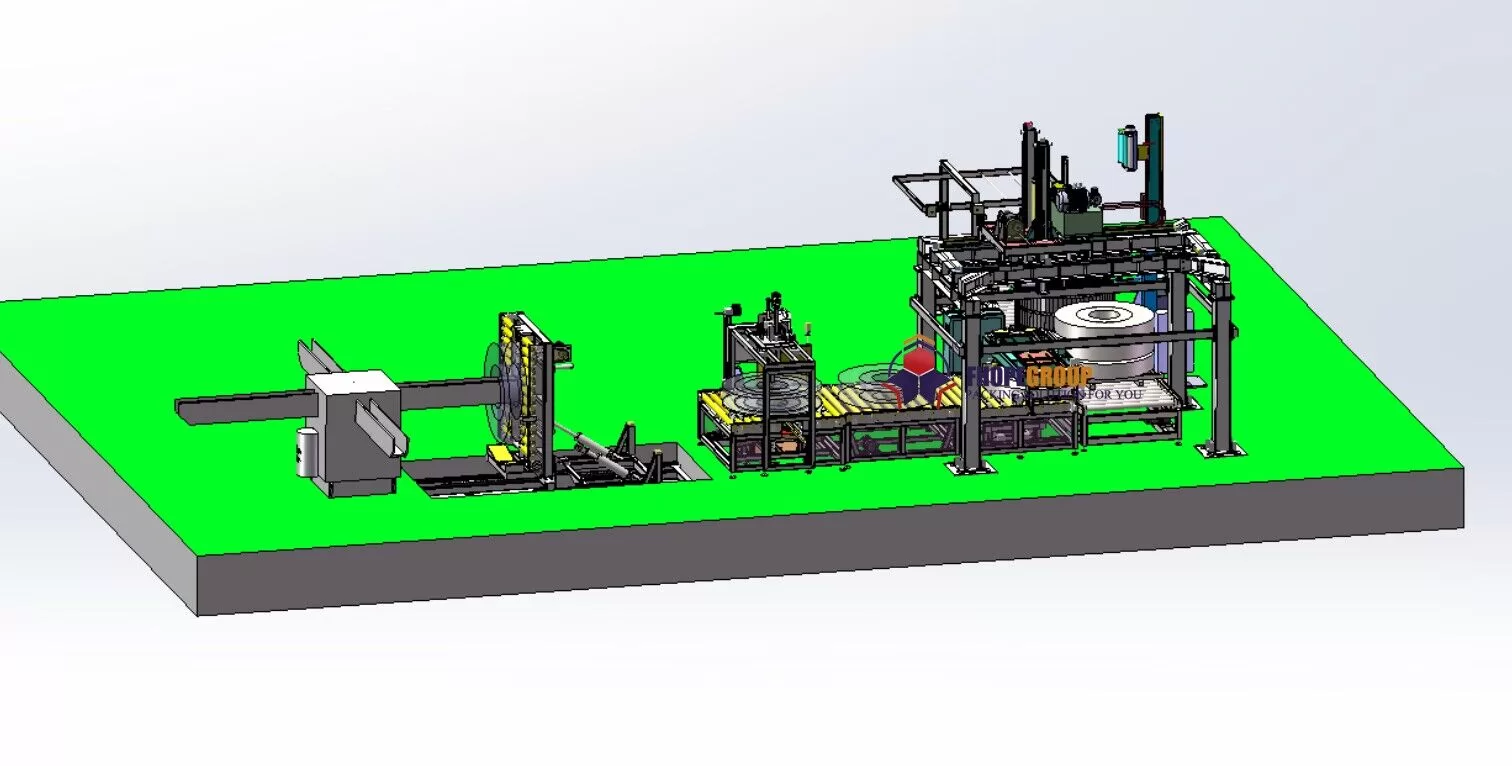You've made a significant investment in your European steel or aluminum processing plant. Your slitting line is state-of-the-art, and your production is finely tuned. The final piece of the puzzle, the slit coil packing line, is meant to be the reliable finishing touch. But what happens when that reliable machine suddenly isn't? An unexpected alarm flashes at 3 AM. Production stops. Every minute that passes is money draining away, deadlines being missed, and pressure mounting on your team. You try to call your equipment supplier, but they are in a different time zone, eight hours away. You are left trying to solve a complex problem over a shaky video call. This isn't just a minor inconvenience; it's a strategic vulnerability that can cripple your operation.
Local service support is vital for a European slit coil packing line because it provides immediate, on-the-ground expertise to resolve issues quickly, minimizing costly downtime. It ensures your machinery stays compliant with ever-changing regional safety and environmental regulations. Ultimately, a local team shifts your supplier from being a distant voice on the phone to a hands-on partner invested in your plant's success, directly boosting uptime, reducing operational risk, and maximizing your return on investment.

This isn't just about fixing things when they break. It's about creating a more resilient, efficient, and profitable operation. As someone who has built a packing machine business from the ground up, I've seen firsthand how the right support structure can make or break a company's success. Let's explore the specific ways local support becomes a competitive advantage for your European facility.
How Does Local Support Minimize Costly Downtime on Aging European Lines?
Your packing line has served you well for years, a true workhorse on the factory floor. But as it ages, you start noticing the signs. Small, unpredictable faults are becoming more frequent. A sensor fails, a pneumatic valve sticks, a software glitch appears. Each time, your entire production flow stops. Your team scrambles to diagnose the issue, often with outdated manuals and no expert on hand. The fear is that one of these small problems will turn into a catastrophic failure, shutting you down for days and jeopardizing important customer orders.
Local support minimizes downtime on aging European lines through rapid on-site response for repairs, proactive preventative maintenance schedules, and a local inventory of critical spare parts. This immediate physical presence eliminates the long delays caused by international travel and shipping. An expert technician can be at your facility in hours, not days, armed with the right parts and knowledge to get your line running again quickly and reliably.

The Compounding Cost of Waiting
When your slit coil packing line stops, the costs add up faster than most people realize. It's not just the idle machine. Your slitting line, which feeds the packing line, must also stop. The operators are being paid to wait. Forklift drivers are waiting. Your shipping department is waiting. The ripple effect is enormous. An overseas supplier's response often starts with an email exchange, followed by a scheduled video call, and then, if the problem is serious, the process of booking flights and hotels. This can easily stretch into three or four days.
I remember a client in Germany with a packing line that was over 15 years old. They had a recurring hydraulic issue that would cause a full stop. My team in China could offer advice over video, and we could guide their local maintenance staff, but we couldn't physically inspect the machine. The problem kept coming back. Once we established a local service partner in Europe, everything changed. The partner's engineer visited the plant, analyzed the wear patterns on the hydraulic components, and identified a specific pressure valve that was failing under peak loads. They replaced it before it could fail again. That single proactive visit saved the client an estimated 40 hours of cumulative downtime for that year alone.
From Reactive Repairs to Predictive Maintenance
The real power of local support is its ability to shift your maintenance strategy from reactive to proactive. A remote supplier sees your machine as a single point in time—the moment it breaks. A local partner sees it as a living system. They can visit your site regularly, speak with your operators, and understand the unique stresses your line faces.
This allows for a truly effective predictive maintenance plan. A local team can install IoT sensors to monitor vibrations, temperatures, and motor currents. They can collect this data and analyze trends to predict when a component is likely to fail. This is how you achieve a goal like 95% uptime. You aren't waiting for failure; you are preventing it during planned maintenance windows.
| Support Model | Response Time | Typical Downtime | Cost Impact |
|---|---|---|---|
| Overseas-Only Supplier | 24-72 hours for initial response | 2 - 5 days per major incident | High (Lost production + travel costs) |
| Local Service Partner | 2 - 4 hours for on-site arrival | < 1 day per major incident | Low (Minimized production loss) |
This proactive approach, enabled only by a local presence, turns your maintenance budget from an emergency fund into a strategic investment in reliability.
As a plant owner or CEO, you are an expert in producing steel or aluminum, not in deciphering legal documents. Yet, you operate in one of the most regulated markets in the world. European standards like the CE Marking requirements and the Machinery Directive are not optional. They are strict, complex, and constantly evolving. A single compliance mistake, even an unintentional one, can result in massive fines, forced operational shutdowns by safety authorities, and serious damage to your company's reputation. Trying to manage this risk from another continent is a recipe for anxiety and potential disaster.
Yes, a local partner is absolutely essential for navigating complex European regulations. They are your on-the-ground compliance experts. They possess current, detailed knowledge of both broad EU-wide directives and the specific national variations in countries like Germany, Italy, or Poland. They can perform on-site audits, help manage the required technical documentation, and ensure that any upgrades or modifications to your packing line remain fully compliant, protecting you from fines and operational interruptions.

The Details of CE Marking and the Machinery Directive
The CE mark on your packing line is a declaration that it meets all EU health, safety, and environmental protection requirements. But it's not a one-time certification. If you modify the machine—for example, by adding a new safety guard or changing a control component—you may need to reassess its compliance. An overseas supplier can't effectively manage this. They can't see the modification in person or interact with your local safety inspectors.
I had a client in Poland who faced this exact issue. They purchased a line that was fully CE-compliant at the time of installation. Two years later, a local safety authority conducted an inspection and found that the placement of the safety light curtains no longer met a newly updated national standard. It was a small detail, but it was enough to threaten a shutdown order. A remote supplier would have been helpless. Our local partner, however, understood the new regulation perfectly. They were able to re-engineer the safety guards and reposition the sensors over a single weekend. They documented the change, updated the technical file, and satisfied the inspector without any major loss of production. This is a level of service that is simply impossible to deliver from thousands of miles away.
Beyond the Machine: Operational and Environmental Rules
Compliance in Europe goes far beyond the machine itself. It extends to how you operate it. Different countries have different rules regarding:
- Worker Safety: Standards for safe interaction with machinery, lockout-tagout procedures, and training requirements.
- Noise Levels: Permissible decibel levels for industrial equipment, which can impact where a machine can be placed and what sound-dampening measures are needed.
- Waste Management: Regulations on the disposal of used materials like plastic film and metal strapping.
A local partner is aware of these nuances. They can advise you on best practices that not only ensure compliance but can also improve your operational efficiency.
| Regulation Area | Typical Requirement | Role of Local Partner |
|---|---|---|
| CE Marking | Conformity to Machinery Directive 2006/42/EC | On-site risk assessments, technical file management, declaration of conformity. |
| Safety Systems | EN ISO 13849 (Safety of machinery) | Design, installation, and validation of safety circuits (e.g., e-stops, light curtains). |
| Environmental | Packaging and Packaging Waste Directive | Advice on using recyclable materials and minimizing waste to meet local targets. |
| National Law | Varies by country (e.g., German "BetrSichV") | Ensures compliance with specific national operational safety ordinances. |
A local partner doesn't just sell you a machine; they help you integrate it into the local regulatory landscape, providing invaluable peace of mind.
What's the True ROI of Local Support vs. a Cheaper Overseas-Only Supplier?
When you look at two quotes side-by-side, the numbers can be very persuasive. The proposal from an overseas supplier without a local European presence is often significantly cheaper on paper. As a business leader like Javier Morales, you are under constant pressure to control capital spending and justify every investment. The temptation to choose the lower price is strong. But what are the hidden costs buried beneath that attractive initial price? The cost of an emergency flight for a technician for what turns out to be a simple fix. The cost of a full week of lost production while a critical spare part is stuck in customs. The cost of mistakes and delays caused by language barriers and time zone differences. That initial "saving" can be completely wiped out by a single major incident.
The true Return on Investment (ROI) of local support is found by looking at the Total Cost of Ownership (TCO), not the initial purchase price. Local support dramatically reduces the massive indirect costs associated with extended downtime, emergency freight for parts, and international travel for technicians. By maximizing uptime and ensuring operational stability, the slightly higher initial investment in a machine with local support delivers a far superior long-term financial return.

Deconstructing the Total Cost of Ownership (TCO)
A smart investment analysis, like the ones I know leaders such as Javier Morales champion, looks beyond the sticker price. The TCO is the real number you should care about. It includes:
- Purchase Price: The initial cost of the equipment.
- Installation & Commissioning: Costs to get the machine set up and running.
- Training: Ensuring your team can operate and maintain the line effectively.
- Spare Parts & Consumables: The ongoing cost of inventory and materials.
- Maintenance & Repairs: The planned and unplanned costs to keep it running.
- Downtime Costs: This is the most critical and often underestimated factor. It is the value of lost production when the line is stopped.
When you compare two suppliers, the initial price may differ by 10-15%. But the downtime costs can differ by 500% or more.
I have seen this happen personally. Years ago, I sold a packing line to a customer in Spain. To win the deal, they pushed hard on price, and we agreed to a package without our local support plan. In the first year, they had two major breakdowns. The total cost to fly my engineers from China, cover their expenses, plus the value of their lost production for those two weeks, was almost 15% of the original machine price. The following year, they signed up for our local support plan. Their unplanned downtime fell by over 90%. The math was painfully clear.
| Cost Component | Overseas-Only Supplier | Supplier with Local Partner |
|---|---|---|
| Purchase Price | €200,000 | €225,000 |
| Annual Maintenance | €5,000 | €8,000 (includes proactive visits) |
| Downtime Cost (Est.) | €100,000 (based on 2 major incidents) | €10,000 (based on rapid response) |
| Total 3-Year Cost | €315,000 + Hidden Costs | €259,000 |
Note: Figures are illustrative examples.
The Intangible, High-Value Returns
The ROI of local support also includes benefits that are harder to put on a spreadsheet but are just as real. There is the peace of mind that comes from knowing an expert is just a short drive away. There is the improved morale of your operating team, who feel supported and can get better, hands-on training in their own language. And most importantly, there is the strategic value of having a partner who understands your local market, your challenges, and your goals. They become an extension of your own team, dedicated to your success. That is a return you can't get from a supplier an ocean away.
How Can a Local Team Accelerate Your Packing Line's Digital and Green Transformation?
You know that the future of manufacturing is digital and green. Your strategic plans are filled with goals for Industry 4.0, MES integration, sustainability, and energy efficiency. These are essential for staying competitive in the modern European market. But turning these high-level strategies into practical reality on the factory floor is a huge challenge. How do you connect your 15-year-old packing line to a new, plant-wide data platform? How can you be sure that a proposed "green" upgrade to a motor will actually deliver the promised 10% energy savings? These are complex, hands-on projects that are nearly impossible to manage from a distance.
A local service team acts as your dedicated transformation partner, accelerating your digital and green initiatives by providing hands-on implementation. They can be physically present to install IoT sensors, manage the complex software integration between your legacy machines and modern MES/ERP systems, and conduct detailed on-site energy audits. They bridge the critical gap between your strategic goals and tangible, on-the-floor results.

Bridging the Gap: Integrating Legacy Machines with Modern Systems
One of the biggest challenges in achieving a "smart factory" is making your existing equipment talk to your new software. A packing line might use an older PLC with a specific communication protocol, while your new MES platform uses a modern standard. An overseas supplier can send you technical diagrams, but they can't be there to run cables, configure network gateways, or troubleshoot the inevitable software handshake issues that arise.
This is where a local team excels. They become the project managers for the integration. They can work directly with your IT department and the MES vendor to ensure a smooth connection. They can install the necessary hardware on the machine and then test and validate the data flow—confirming that production counts, cycle times, and error codes from the packing line are appearing correctly in your central dashboard. This hands-on work is what makes full production visualization a reality.
On-Site Audits for Real Energy Savings
Every CEO wants to lower energy costs, a major challenge given volatile prices. A remote supplier might suggest upgrading to a more energy-efficient motor. That's a good idea, but it's an incomplete solution. A local partner can take this much further.
I saw this with a forward-thinking client in the Netherlands. Much like Javier Morales, their CEO was focused on both cost reduction and environmental impact. We proposed an energy-efficient motor for their main wrapping ring. A remote team's involvement would have ended there. Our local partner, however, went to the site with a portable power logger. They spent a week measuring the real-time energy consumption of the old motor during every phase of the packing cycle. They analyzed the data and created a report that proved the new motor would have a 2-year payback period based on their specific usage. After installing the new motor, they ran the same tests to verify the savings. That is the difference between a simple supplier and a true strategic partner who helps you achieve your goals.
| Transformation Goal | Overseas Supplier Action | Local Partner Action |
|---|---|---|
| Digitalization (MES) | Provides communication protocol data | Manages on-site installation, cabling, software configuration, and data validation. |
| Predictive Maintenance | Suggests a spare parts list | Installs IoT sensors, collects baseline data, and helps set up predictive alerts. |
| Energy Reduction | Sells an energy-efficient component | Conducts on-site energy audit, proves ROI, installs component, and verifies savings. |
| Material Savings | Recommends a thinner film | Optimizes machine tension/pre-stretch on-site to use less film without losing quality. |
A local team doesn't just sell you technology; they ensure that technology delivers the results you need for a more profitable and sustainable future.
Conclusion
Local support is not a cost; it's an investment in your European line's uptime, compliance, and future profitability. It transforms a supplier relationship into a true strategic partnership.




